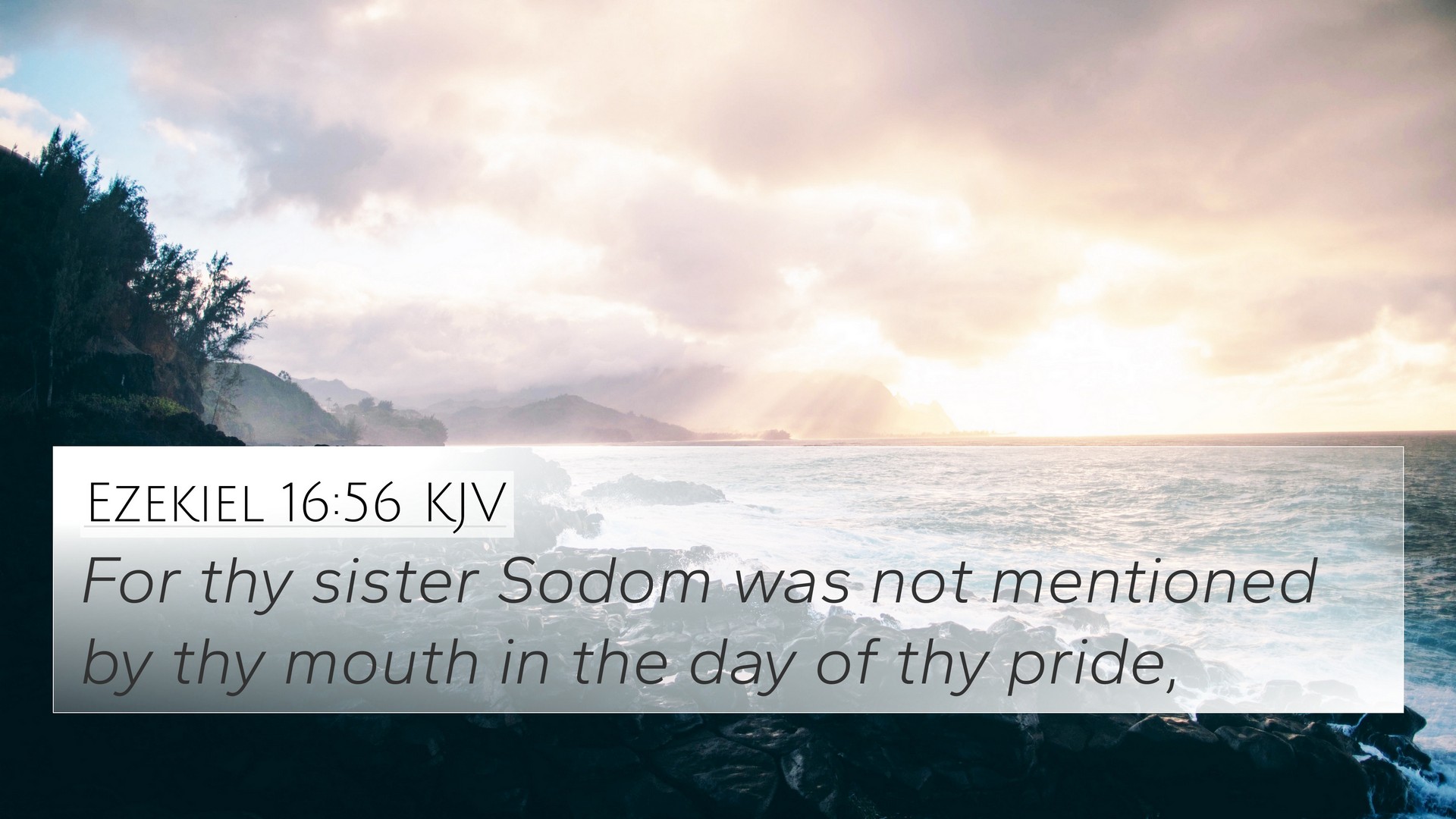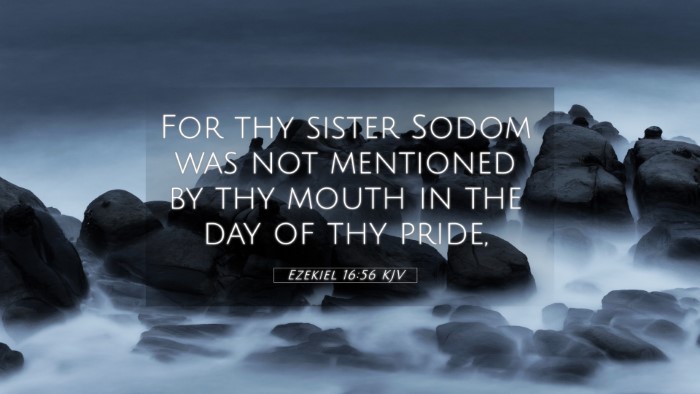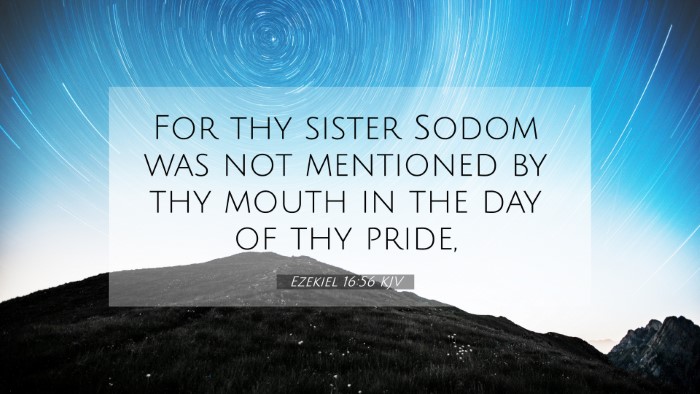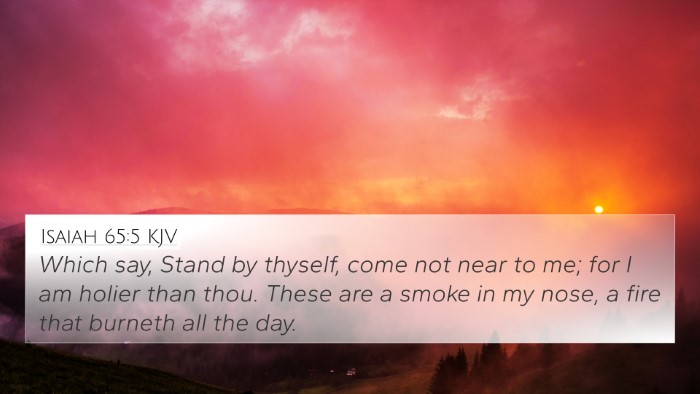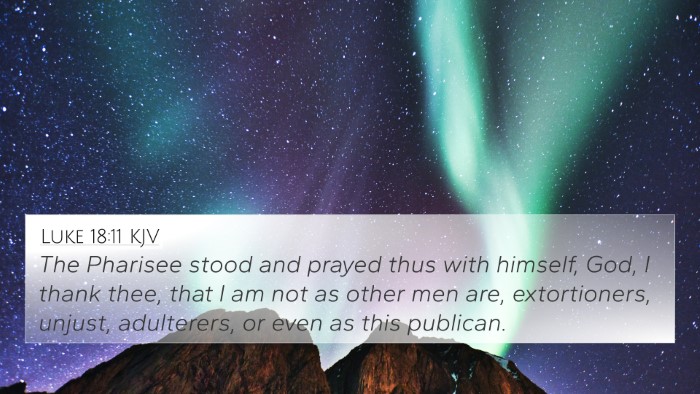Ezekiel 16:56 - Verse Meaning and Interpretation
Ezekiel 16:56 reads: "For thy sister Sodom was not mentioned by thy mouth in the day of thy pride." This verse emphasizes the pride of Jerusalem, contrasting it with the fate of Sodom, a city known for its wickedness. Below, we explore interpretations and meanings drawn from public domain commentaries to aid in understanding this verse.
This verse is situated within a broader context where God, through the prophet Ezekiel, is denouncing Jerusalem's sins and calling them to repentance. It uses Sodom as a stark example of divine judgment.
Commentary Insights
-
Matthew Henry:
Henry highlights that Jerusalem took pride in her status while forgetting the lessons learned from the destruction of Sodom. This pride is sinful since it leads to a false sense of security and a disregard for moral decay.
-
Albert Barnes:
Barnes notes that the reference to Sodom serves as a warning. Despite Jerusalem's superior position, their sinful actions are likened to that of Sodom, equating their guilt and implying that judgment could follow. He emphasizes the importance of remembering the lessons of the past to avoid repeating mistakes.
-
Adam Clarke:
Clarke points out that pride uniquely blinds individuals to the consequences of their actions. He stresses that Jerusalem’s failure to mention Sodom during their arrogance reflects a heart unwilling to learn from history and an ignorance of God’s judgment.
Thematic Connections to Other Bible Verses
For a deeper understanding, consider the following Bible verse cross-references that relate to the theme of pride and divine judgment:
- Genesis 19:24-25 - The destruction of Sodom illustrates the judgment that comes from hubris and sin.
- Ezekiel 18:30 - Calls for repentance and turning from offenses to avoid judgment.
- Lamentations 3:39 - Questioning why the living complain when punished for their sins, reflecting the theme of divine justice.
- James 4:6 - "God opposes the proud but gives grace to the humble," emphasizing the destructive nature of pride.
- Proverbs 16:18 - "Pride goes before destruction, a haughty spirit before a fall," reiterating the consequences of pride.
- Luke 17:28-30 - Draws parallels between the days of Noah and the days of Lot in Sodom, further connecting judgment and moral decay.
- Matthew 11:23 - Jesus mentions Chorazin and Bethsaida regarding their unrepentance, likening their sin to that of Sodom.
Inter-Biblical Dialogue on Pride and Judgment
The connection between Bible verses that relate to each other showcases a recurring theme across the scriptures. Pride, as depicted in Ezekiel 16:56, is a direct antecedent to divine wrath. Each excerpt echoes God's disdain for pride and emphasizes repentance:
- Isaiah 2:12 - "For the day of the Lord of hosts shall be upon everyone that is proud and lofty," aligning with the dire warnings against Jerusalem's pride.
- Proverbs 6:16-17 - Lists pride as a sin that God hates, affirming the overarching biblical narrative against arrogance.
Tools for Understanding and Study
To delve deeper into such themes and comparative Bible verse analysis, consider using:
- Bible Concordance: A tool for finding cross-references helps in understanding connections.
- Cross-Reference Bible Study: A method to explore scripts that discuss similar themes across the Bible.
- Bible Cross-Reference Guide: A resource for identifying and analyzing related scriptures.
Conclusion
Ezekiel 16:56 serves as a stark reminder of the dangers of pride and the importance of recognizing the lessons from past judgment. The commentary insights alongside scriptural cross-referencing illustrate that the teachings of Scripture are interconnected, warning of the dire consequences of unrepentant hearts. Each referenced verse serves as a poignant reminder that all individuals should strive for humility and awareness of God’s judgment, an essential aspect of living a faithful life.
Utilizing cross-reference systems can elevate one’s understanding of Biblical themes, encouraging deeper study and insight into God’s word and His expectations of humanity.
